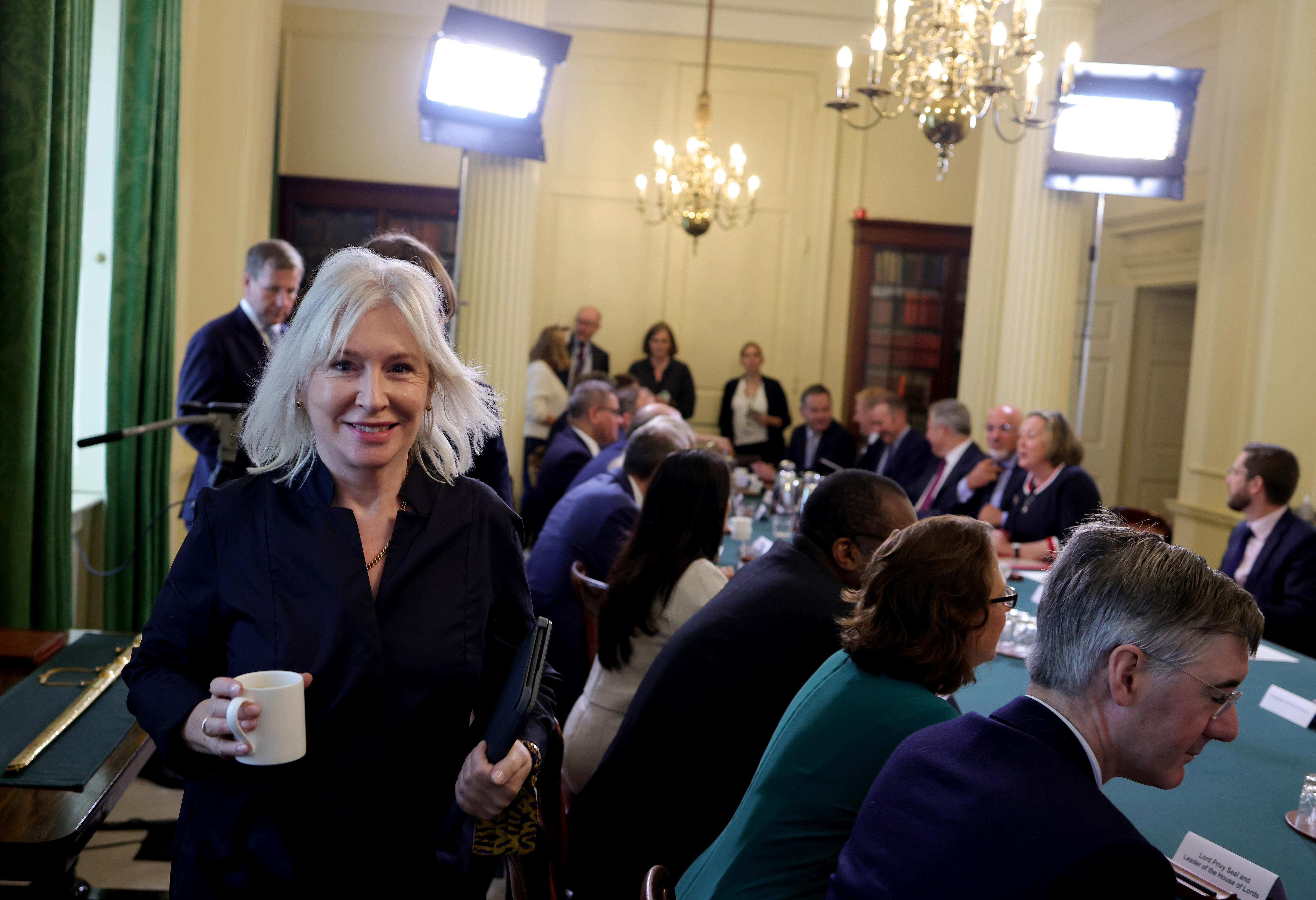The once lingering member for Mid Bedfordshire may have left parliament, but her presence is still very much felt in SW1.
Nadine Dorries’ latest book, entitled The Plot: The Political Assassination of Boris Johnson, was initially set to be published on 28th September, just three days before the beginning of Conservative Party Conference. But owing to “the required legal process needed to share [Dorries’] story”, it was delayed to a new date — but one of no less political sensitivity: 9th November 2023.
It means the book will hit shelves just two days after the King’s Speech is delivered tomorrow, in what has been trailed by ministers as an important staging post on the long road to a general election. But crucially, ahead of its publication date, The Plot’s key revelations are now being drip-fed out via the Daily Mail, the newspaper that employs Dorries as a columnist and has been granted exclusive access to the fruits of her sleuthing.
The Plot, which purports to survey the recent history of the Conservative Party going back to the early 2000s, has been hyped by its author for some time. In her lengthy resignation broadside, in which the ex-culture secretary took aim at the PM for helming a “zombie parliament”, Dorries took solace in the “comfort” she would soon derive from explaining how the PM “achieved this undemocratic upheaval”.


Dorries’ thesis, rehearsed at length in the pages of the Daily Mail, is that Boris Johnson was brought down as prime minister by a secretive “cabal” of No 10 insiders — and that the same conclave masterminded the downfalls of Liz Truss, Theresa May, David Cameron and, even, Iain Duncan Smith in 2003.
Dorries names cabinet minister Michael Gove, former No 10 advisers Dominic Cummings and Dougie Smith, and “Dr No” as among the guilty parties. This “Dr No” figure, it is alleged, is an insider so brutish that he once butchered a rabbit dear to a former partner in revenge.
Trouble for Rishi Sunak?
Dorries suggests that, by 2019, this shadowy constellation of Downing Street movers and shakers had already decided that Rishi Sunak — then a mere under-secretary of state reporting to communities secretary Sajid Javid — should be prime minister.
In this way, the useful electoral asset that is Boris Johnson would serve as a mere conduit as Gove, Cummings and co. — manipulating and manoeuvring inside the walls of Whitehall — phased in Sunakian rule. How events have unfurled since then, through Johnson’s rolling political scandals and Liz Truss’ blunder ridden-premiership, have done so according to “The Movement’s” grand design.
Thus, in The Plot, Dorries weaves her present-day grievances at Sunak through the recent history of the Conservative Party; it is an analytical thread that somehow leads her to the defenestration of Iain Duncan-Smith as Conservative leader and perhaps beyond (could Robert Peel, ousted as prime minister in 1846, have been a potential victim of “The Movement’s” sly politicking — or some equally crafty precursor cabal? Will the Mail on Sunday’s political editor Glen Owen ask Dominic Cummings his view of the Corn Laws?).
The former culture secretary’s narrative has, of course, prompted a series of splashes in the Mail, but much of Westminster will be uninterested in her hagiographic retelling of recent Conservative history. Dorries is one of increasingly few Johnson acolytes who are willing to publicly fight his corner; her broader spiel, sensational though it seems, suffers from the not insignificant drawbacks of being both questionable in veracity and politically impotent.
However, other shocking revelations flowing from Dorries’ pen, supplementary to The Plot’s overarching narrative, will undoubtedly trigger ructions in SW1. For instance, the Mail has also run with the story that former chairman Jake Berry once wrote to police because he was concerned that allegations of rape against an MP had not been properly dealt with, and that one victim was getting support paid for by the Conservative Party.
Deputy prime minister Oliver Dowden, himself a former party chairman, was questioned on the topic yesterday. He told Sky News that there was a “limit” to what he could say, because the Mail on Sunday article “doesn’t contain any details of the persons involved”. But he added: “We take any allegations exceptionally seriously.
Asked about payments to an alleged victim on Times Radio, Dowden insisted it was not “something that crossed my desk as chairman of the Conservative Party”, although he acknowledged: “It may be the case. I’m not denying that it could be the case that those payments were made”.
Dowden also denied recognising claims in Dorries’ book that there are “30 bad” MPs “out there” at any given time.
And this morning, Rishi Sunak described the allegations as “very serious” as he urged anyone with evidence of criminal acts to talk to the police.
This story, of course, is deeply unhelpful for the prime minister, who intends to use this week to continue the hard reboot of his premiership first signalled at Conservative Party conference last month. New measures on boosting North Sea production with annual oil and gas licensing rounds, the introduction of a civil offence to fine charities found to have given tents to rough sleepers and a ban on smoking for future generations are among the proposals expected to line Sunak’s intensely political path to a general election.
But — beyond any division Dorries hopes to inspire with The Plot — her aforementioned account will contribute to the deep feeling of malaise which presently envelops the Conservative parliamentary party. It compounds recent revelations at the Covid inquiry and the slew of sleaze stories that have implicated Tory backbenchers.
Ultimately, it seems every time Sunak signals some grand new departure, seizing on ephemeral political momentum, the PM is instead reminded of how difficult his task really is.
Josh Self is Editor of Politics.co.uk, follow him on Twitter here.
Politics.co.uk is the UK’s leading digital-only political website, providing comprehensive coverage of UK politics. Subscribe to our daily newsletter here.

